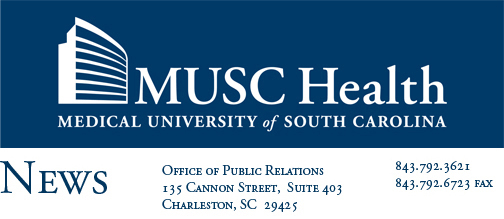

Nov. 13, 2008
CHARLESTON -- All newborn babies need special care, but some require intensive medical attention following delivery. The interdisciplinary team of trained health care professionals who provide specialized care for the tiniest patients in the Neonatal Intensive Care Unit (NICU) at the Medical University of South Carolina (MUSC) have received recognition from the Vermont Oxford Network (VON) for their efforts to improve the quality of care for these vulnerable infants.
Babies admitted to the NICU are premature, have very low birth weights (VLBW), or have a medical or surgical condition that requires specialized care. VON is non-profit voluntary collaboration of health care professionals dedicated to improving the quality and safety of medical care for newborn infants and their families. Established in 1988, VON is comprised of nearly 700 NICUs around the world who collaborate in research, education and quality improvement efforts.
MUSC cares for approximately 250 very low birth weight (VLBW) infants (between 500 and 1,500 grams) each year. "When babies are protected from the damaging effects of oxygen, ventilators and infections they do better and go home sooner," said Robin Bissinger, APRN, Ph.D., Neonatal Nurse Practitioner program director. The MUSC staffís dedication to quality improvement has improved care and subsequently helped reduce the length of stay with VLBW infants going home to their families approximately two to three weeks sooner than the national average.
Since joining VON several years ago, MUSC has focused on the following key quality areas: hospital acquired infections (HAI), chronic lung disease (CLD) and staffing for excellence. HAI can pose a huge threat to babies struggling to live. Following the motto, "a hospital acquired infection is not a birth right," MUSC developed a multidisciplinary team of providers to address causes of HAI, and consult other institutions while reviewing and implementing techniques to decrease HAI in the NICU. As a result of this collaboration, MUSC has been able to reduce its infection rate by 75 percent in five years, and is now within the group of leading hospitals in the network. Similarly, the rate of CLD in MUSCís NICU is now well under one half of what is typically seen in NICU graduates, again representing a substantial improvement for MUSCís infants.
"There is not one service that enters the doors of our Neonatal Nurseries that have not participated even by simply washing their hands and rolling up their sleeves," said Bissinger. "The commitment of our nurses to not only work in a unit where change is a constant factor in their lives, but embracing the change, has been an amazing contribution to these outcomes. In many cases it is the staff that drives the change and we as leaders just keep making sure the road to change is clear for them."
About MUSC
Founded in 1824 in Charleston, The Medical University of South Carolina is the oldest medical school in the South. Today, MUSC continues the tradition of excellence in education, research, and patient care. MUSC educates and trains more than 3,000 students and residents, and has nearly 10,000 employees, including 1,300 faculty members. As the largest non-federal employer in Charleston, the university and its affiliates have collective annual budgets in excess of $1.3 billion. MUSC operates a 600-bed medical center, which includes a nationally recognized Children's Hospital and a leading Institute of Psychiatry. For more information on academic information or clinical services, visit www.musc.edu or www.muschealth.com.
#####